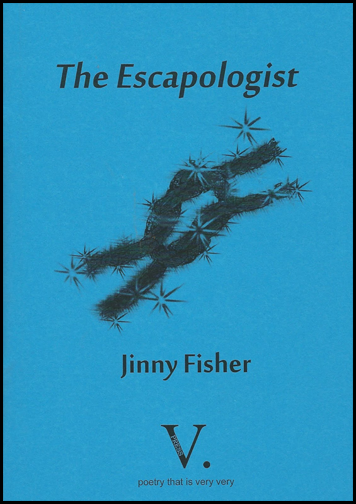The Escapologist, Jinny Fisher
V.Press, 2019 £6.50
Omens
These poems start jauntily, with two poems for the poet’s daughter, Miranda. ‘The Scarf’, a concrete poem taking the winding form of a scarf, and leading the eye down, then up, the page, is particularly delightful. The world seems a grand place.
The third poem, ‘Antiphon’ features a ‘so-tall daughter’ too, but mother and daughter, as they leave some ‘festival sludge’, after joyful singing, ‘almost trample / two tiny wellington boots, painted with daisies, / half-buried in the mud’.
There’s a great deal buried here. After those ‘tiny wellington boots’, the ‘hospice / shop’ mentioned in ‘The Scarf’ seems more ominous.
‘A Brother in Six Scenes’, which follows, is definitely dark (‘I can have his clothes / in a grey bin bag, if I want’) and it is the first poem in which ‘Father’ appears. Father’s capital F is grimly well-deserved:
Brother at the dining table —
under Father’s gaze.
His eyes stay trained on the plate.
Father continues to be a troubling figure in several poems. He likes to take photographs. He grunts and curses as he completes complex photographic procedures.
Sunday lunch in this family is an endurance test with Father in charge and wielding a carving knife (in ‘Make Way for the Sunday Lunch’).
‘Screen Memory’ establishes the fact that a ‘shiny red hand-pump’ evokes an ominous, suppressed childhood memory.
In ‘Testimony’, things have moved forward alarmingly, or so it seems. A man (unnamed) in court is questioned about ‘photos / printed from his hard-drive’, once of which is ‘me, swinging upside down / from the paddock fence, my skirt / flopped over my face’. The man in the dock
[ ...] repeats over and over: This
is a picture I did not take.
So the world of these poems contains beauty and love, but it is undoubtedly ominous. Much is shared. Nothing is hammered home. There are careful layers, many of them, and the poems draw their reader back and reward re-reading. They are expert pictures from the life, and the poet has declared them fearlessly her own.